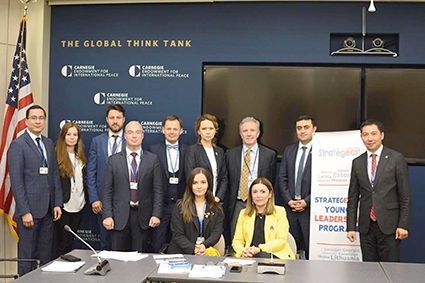Young Leadership Program
From June 3-10, nine rising government leaders from former Soviet countries visited the United States as part of the first Young Leadership Program. The program was organized and sponsored by the Open World Leadership Center, Eurasia Foundation, and StrategEast. The program’s goal was to help promote closer ties between the West and PSNR (StrategEast founder Anatoly Motkin’s acronym, meaning “post-Soviet non-Russian”) countries by giving young PSNR deputy ministers the chance to see inside governmental mechanisms in the United States, deepening their exposure to the rule of law, free markets, and democracy.
During the program, participants met with Congressman Joe Barton, Ambassador John O’Keefe, Ambassador Beth Jones, Vice Chairman of the Newseum Shelby Coffey, and other government officials, and representatives from civil society and the private sector. The participants also spent several days in homestays with average American families – half the group in Philadelphia, PA and the other half in Richmond, VA. The program began with viewing one of the original Declaration of Independence copies at the National Archives in Washington, D.C., then went on to explore how a country operates on a foundation of the principals of the Declaration.
The participants are all deputy ministers, under the age of 40, who speak good English, and work in sectors which influence their countries’ economies. From Georgia, Deputy Minister of Environmental Protection and Agriculture Nino Tandilashvili participated in the program. Throughout the week of meetings and trainings, Tandilashvili said she observed and absorbed a lot to take back to Georgia. She was particularly impressed by how US government officials seemed to take pride in their work and felt a sense of importance in representing their voters that she feels is missing in Georgia. She described the government workers they interacted with on the program as “serious, responsible, and honest,” and working for the betterment of the people, and would like to see Georgian government employees expressing those characteristics more frequently. Tandilashvili says that Georgian public officials lack a service mentality, and the country generally lacks the culture of public service seen in the US.
A meeting with Philadelphia’s Inspector General, Amy Kurland, was particularly interesting for many program participants, as all of their countries have struggled with corruption, to varying degrees, since independence. With such a small group, the dynamic between participants was casual, intimate, and sociable. There were many shared experiences and challenges, but also room to share best practices and problem-solving techniques. The program is envisioned as, in part, a networking opportunity and a bridge builder between PSNR countries and across the Atlantic. Representatives from government, business and civil society have all expressed desire and openness to keep lines of communication open with participants for advice and discussion, and to work on potential collaborative projects. Motkin is optimistic that the program will facilitate opportunities for participants and their local colleagues to inform US leaders about the events in their countries and share information. Tandilashvili says it was encouraging to meet the other participants and to see how young people can become high level decision makers.
When asked what Georgia can learn from the US, Tandilashvili said that “we [Georgia] share the principles of the US and Europe” – both are models for Georgia’s development. As she returns to Tbilisi, she plans to be more involved with promoting freedom of the press and meeting with activists and civil society representatives. She believes that government officials should more actively communicate with the people and sees sharing information as a critical component of an informed electorate and democracy. “This program should continue to give chances to young decision makers to see how civil society works and how institutions work in the United States,” says Tandilashvili. She advocates for more unofficial, non-working visits and exchanges, praising the multi-sectoral, deep dive model that the Young Leadership Program provided. Tandilashvili’s most significant take away from the program was an understanding of and respect for American values. “Every time I think about the United States, I think about three words,” she says, “We the people. Despite the challenges, I know the US will stay strong because of this.”
StrategEast hopes to continue the program, perhaps making it an annual event, or having a series of small events throughout the year. As the program came to a close, participants were left with three questions to ponder: what are the main challenges of the PSNR space? How can PSNR countries be helpful to each other in overcoming challenges? And How can US institutions be helpful in overcoming challenges?
By Samantha Guthrie











